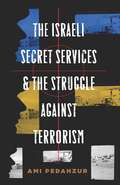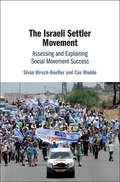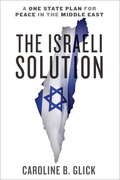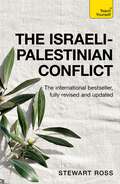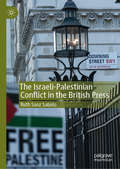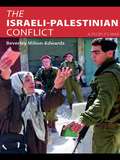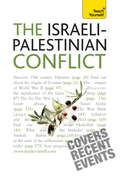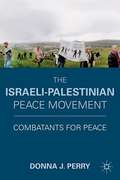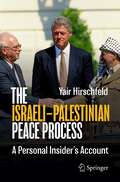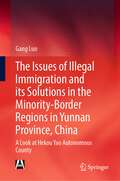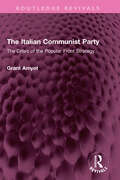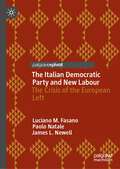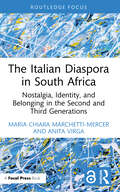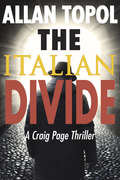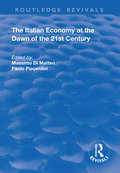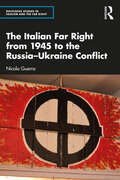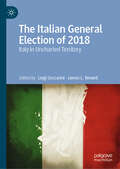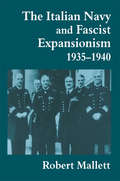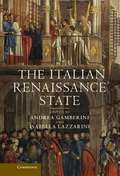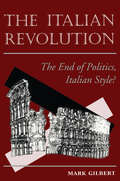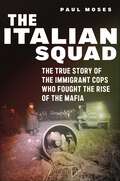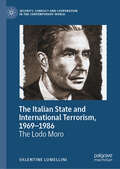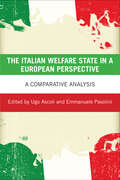- Table View
- List View
The Israeli Secret Services and the Struggle Against Terrorism (Columbia Studies in Terrorism and Irregular Warfare)
by Ami PedahzurWhile Mossad is known as one of the world's most successful terrorist-fighting organizations, the state of Israel has, more than once and on many levels, risked the lives of its agents and soldiers through unwise intelligence-based intervention. The elimination of Palestinian leaders and militants has not decreased the incidence of Palestinian terrorism, for example. In fact, these incidents have become more lethal than ever, and ample evidence suggests that the actions of Israeli intelligence have fueled terrorist activities across the globe.An expert on terror and political extremism, Ami Pedahzur argues that Israel's strict reliance on the elite units of the intelligence community is fundamentally flawed. A unique synthesis of memoir, academic research, and information gathered from print and online sources, Pedahzur's complex study explores this issue through Israel's past encounters with terrorists, specifically hostage rescue missions, the first and second wars in Lebanon, the challenges of the West Bank and Gaza, Palestinian terrorist groups, and Hezbollah. He brings a rare transparency to Israel's counterterrorist activities, highlighting their successes and failures and the factors that have contributed to these results. From the foundations of this analysis, Pedahzur ultimately builds a strategy for future confrontation that will be relevant not only to Israel but also to other countries that have adopted Israel's intelligence-based model.
The Israeli Settler Movement: Assessing and Explaining Social Movement Success
by Cas Mudde Sivan Hirsch-HoeflerThe Israeli settler movement plays a key role in Israeli politics and the Arab-Israeli conflict, yet very few empirical studies of the movement exist. This is the first in-depth examination of the contemporary Israeli settler movement from a structural (rather than purely historical or political) perspective, and one of the few studies to focus on a longstanding, radical right-wing social movement in a non-western political context. A trailblazing systematic assessment of the role of the settler movement in Israeli politics writ large, as well as in relation to Israel's policy towards the West Bank, this book analyzes the movement both as a whole and as a combination of its parts (i.e. branches) - institutions, networks, and individuals. Whether you are a student, researcher, or policymaker, this book offers a comprehensive and original theoretical framework alongside a rich empirical analysis which illuminates social movements in general, and the Israeli settler movement in particular.
The Israeli Solution
by Caroline GlickA manifesto that exposes the flaws in the two-state policy of the United States toward Israel and the Palestinians and offers a direct and powerful call for Israeli sovereignty in the region. The reigning consensus in elite and academic circles is that the United States must seek to resolve the Palestinians' conflict with Israel by implementing the so-called two-state solution. Establishing a Palestinian state, so the thinking goes, would be a panacea for all the region's ills. It would end the Arab world's conflict with Israel, because the reason the Arab world is anti-Israel is that there is no Palestinian state. It would also nearly erase the principal cause of the violent extremism in the rest of the Middle East. In a time when American politics are marked by partisan gridlock, the two-state solution stands out for its ability to attract supporters from both sides of the ideological divide. But the great irony is that it is one of the most irrational and failed policies the United States has ever adopted. Between 1970 and 2013, the United States presented nine different peace plans for Israel and the Palestinians, and for the past twenty years, the two state solution has been the centerpiece of U.S. Middle East policy. But despite this laser focus, American efforts to implement a two-state peace deal have failed--and with each new attempt, the Middle East has become less stable, more violent, more radicalized, and more inimical to democratic values and interests. In The Israeli Solution, Caroline Glick, senior contributing editor to the Jerusalem Post, examines the history and misconceptions behind the two-state policy, most notably:- The huge errors made in counting the actual numbers of Jews and Arabs in the region. The 1997 Palestinian Census, upon which most two-state policy is based, wildly exaggerated the numbers of Palestinians living in the West Bank and Gaza.- Neglect of the long history of Palestinian anti-Semitism, refusal to negotiate in good faith, terrorism, and denial of Israel's right to exist.- Disregard for Israel's stronger claims to territorial sovereignty under international law, as well as the long history of Jewish presence in the region.- Indifference to polling data that shows the Palestinian people admire Israeli society and governance. Despite a half-century of domestic and international terrorism, anti-semitism, and military attacks from regional neighbors who reject its right to exist, Israel has thrived as the Middle East's lone democracy. After a century spent chasing a two-state policy that hasn't brought the Israelis and Palestinians any closer to peace, The Israeli Solution offers an alternative path to stability in the Middle East based on Israeli sovereignty over Judea and Samaria.
The Israeli-Palestinian Conflict (Teach Yourself Educational)
by Stewart RossThis book is the essential guide to the extraordinarily complicated and developing situation in Israel/Palestine. Fully updated to reflect the tense and troubling changes in the region since 7 October 2023, this book puts the present situation into its broader context and, examining all perspectives, it unravels the origins and development of issues which make the headlines daily. Each aspect of this complex conflict is explained with engaging objectivity which will ensure you can examine the issues from all perspectives and in a social, political, historical and international framework.
The Israeli-Palestinian Conflict (Teach Yourself Educational)
by Stewart RossThis book is the essential guide to the extraordinarily complicated and developing situation in Israel/Palestine. Fully updated to reflect the tense and troubling changes in the region since 7 October 2023, this book puts the present situation into its broader context and, examining all perspectives, it unravels the origins and development of issues which make the headlines daily. Each aspect of this complex conflict is explained with engaging objectivity which will ensure you can examine the issues from all perspectives and in a social, political, historical and international framework.
The Israeli-Palestinian Conflict in the British Press
by Ruth Sanz SabidoThe Israeli-Palestinian Conflict in the British Press provides an extensive empirical analysis of how the Israeli-Palestinian conflict has been constructed in British national newspapers since 1948. It traces the evolution of representations of the conflict by placing them in a historical context, with particular reference to Britain’s postcolonial relation to Palestine, and by presenting an in-depth analysis of the evolution of press language, including the use of terms such as ‘terrorism’ and ‘terrorist’ to classify agents of political violence. It applies an original approach to the study of media coverage, using a Postcolonial Critical Discourse Analysis framework, an innovative method that examines selected case studies in relation to theories of postcolonialism and discourse. Using this unique hybrid methodology, Sanz Sabido provides a thorough and precise unpicking of a highly mediated conflict.
The Israeli-Palestinian Conflict: A People's War
by Beverley Milton-EdwardsThe conflict between Israelis and Palestinians is one of the most enduring and complex in the modern world. But, why did the conflict break out? Who is demanding what, and why is peace so difficult to achieve? The Israeli-Palestinian Conflict tackles the subject and analyses the conflict from its historical roots in the late nineteenth century to the present attempts at conflict resolution in the twenty-first century. Framing the debate and analysis around issues such as Zionism, Palestinian nationalism, international peace efforts, the refugees, state-building, democracy and religious opposition and highlighted by first hand quotes and sources of the conflict from its major participants, Beverley Milton-Edwards explores the deep impact of the conflict on regional politics in the Middle East and why the enmity between Palestinians and Israelis has become a number one global issue drawing in the world’s most important global actors. An essential insight into the complexities of one of the world’s most enduring conflicts between Israelis and Palestinians, this textbook is designed to make a complex subject accessible to all. Key features include a chronology of events and annotated further reading at the end of each chapter. The Israeli-Palestinian Conflict is an ideal and authoritative introduction into aspects of politics in Israel, among the Palestinians – a vitally important issue for those studying the politics of the Middle East.
The Israeli-Palestinian Conflict: Teach Yourself (Teach Yourself Educational)
by Stewart RossUnderstand the Israeli-Palestinian Conflict is the essential guide to one of the world's most distressing confrontations. Putting the present situation into its broader context and examining all perspectives, it unravels the origins and development of issues which make the headlines daily. Each aspect of this complex conflict is explained with engaging objectivity which will ensure you can examine the issues from all perspectives and in a social, political, historical and international framework.NOT GOT MUCH TIME?One, five and ten-minute introductions to key principles to get you started.AUTHOR INSIGHTSLots of instant help with common problems and quick tips for success, based on the author's many years of experience.EXTEND YOUR KNOWLEDGEExtra online articles at www.teachyourself.com to give you a richer understanding.FIVE THINGS TO REMEMBERQuick refreshers to help you remember the key facts.TRY THISInnovative exercises illustrate what you've learnt and how to use it.
The Israeli-Palestinian Peace Movement
by Donna J. PerryThis study shows the promise of Israeli-Palestinian peace from the perspective of former combatants who transform themselves, each other, and those around them through moral conviction and action that reclaims the dignity of both peoples.
The Israeli–Palestinian Peace Process: A Personal Insider's Account
by Yair HirschfeldThis book describes the evolution of the Israeli-Palestinian peace-seeking process from 1967 to the present. Written from the perspective of Israel’s most prominent peace activist, it offers an unparalleled insider’s account of a crucial set of negotiations intended to settle a seemingly endless conflict. Hirschfeld’s historical narrative provides a wealth of knowledge and experience that is indispensable to anyone seeking to seriously approach the Middle East conflict. The book’s thorough analysis of the successes and failures of all peace efforts since the Six-Day War represents an essential asset for future negotiators, politicians, diplomats and peace activists alike. Moreover, the book shares pearls of human wisdom that anyone searching to resolve conflicts in general should take to heart. The book is of burning topicality. Not only with a view to the normalisation process between Israel and Arab countries that began with the recent Abraham Accords (2020) but also regarding the new “age of war” in Europe, sparked by Russia’s war of aggression against Ukraine.
The Issues of Illegal Immigration and its Solutions in the Minority-Border Regions in Yunnan Province, China: A Look at Hekou Yao Autonomous County
by Gang LuoThis book analyzes the governance of illegal immigrants in ethnic areas along China’s southwest border. Since China is not an immigrant country and lacks an immigrant culture, the goals of law enforcement departments are limited to sanfeirenyuan (three types of illegal persons: illegal immigrants, illegal residents, and illegal employees). The transformation of sanfeirenyuan, an issue that has plagued China for many years, into an “illegal immigration” governance issue that is of general concern to the international community, has led to fundamental changes in research methods and research topics. The research presented here makes the issue China now faces part of global issues; by using the “worldview on China’s issues” to assess current problems, it can also show how “China’s solutions can be applied to global issues.” The unique feature of this book is that it approaches the issue of illegal immigration as an unconscious crisis. Accordingly, it holds substantial value in terms of exploring the theoretical basis of and governance methods for maintaining national security in the context of globalization, as well as the early warning mechanisms and crisis management in the context of China’s national security. Since China has a long southwest border, the stability and security of border ethnic areas have long played a decisive role in the stability and security of the country as a whole: if the frontiers are stable, the country enjoys enhanced security. Consequently, investigating the governance mechanism for illegal immigrants in the ethnic areas of the southwest border is of considerable practical relevance. This book offers a valuable asset for researchers in related fields and can be used as a reference book for students of national security. It also benefits practitioners in relevant management departments.
The Italian Communist Party: The Crisis of the Popular Front Strategy (Routledge Revivals)
by Grant AmyotFirst published in 1981 The Italian Communist Party looks at the debate within the party and how its strategy was forged. It considers the development of Eurocommunism, the rise and fall of the Ingrao Left and many other topics related to the formulation of the PCI. Based on original research by the author, it explores how key issues were debated and resolved in various representative provincial organisations of the party. It shows how changing ideals affected policy and the party’s organisation and how different attitudes emerged from the diverse social and economic conditions in the different parts of Italy. This book is an important historical document for scholars and researchers of Italian communism, European communism and political studies.
The Italian Democratic Party and New Labour: The Crisis of the European Left
by James L. Newell Luciano M. Fasano Paolo NataleIn this intriguing book, professors Fasano, Natale and Newell offer a comprehensive and compelling discussion of the European left's evolution. As the left grapples with its historical legacy and attempts to connect with voters in a changing political landscape, the authors examine the journey of the Italian Democratic Party (PD) from its inception to the present day, shedding light on its evolution and struggles. Drawing a fascinating parallel with the UK's New Labour, the book explores the challenges faced by these parties as they navigate their post-communist heritage. A timely exploration of social-democratic politics in an era of populism, this book is a must-read for political enthusiasts, scholars, and anyone interested in the changing landscape of the left in all the European countries.
The Italian Diaspora in South Africa: Nostalgia, Identity, and Belonging in the Second and Third Generations (Routledge Studies in Development, Mobilities and Migration)
by Maria Chiara Marchetti-Mercer Anita VirgaThis book investigates the experiences of second- and third-generation Italians living in South Africa, exploring how nostalgia for Italy influences their sense of identity and belonging. The Italian community in South Africa is a unique diaspora, with a complex history, including roots in Italian colonial activities in Africa, and in World War II. This book looks at how the descendants of these early migrants take pride in being Italian and value the Italian language. They also ascribe much importance to their family roots, and have often created a romanticized image of Italy, mostly based on childhood vacation visits. The longing for an imaginary idealized version of Italy is closely linked to their wider search for a sense of identity and belonging against the backdrop of South African society, currently still grappling with its own multicultural identity. Interdisciplinary by design, this book draws on insights from both cultural studies and psychology in order to shine a light on an important and under-studied diasporic community. The book will be of interest to scholars from across migration studies and the Humanities in general.
The Italian Divide (Craig Page Thriller #5)
by Allan TopolWhen prominent Italian banker Frederico Castiglione is murdered in an apparent jewelry robbery gone wrong, things are not what they seem. Former CIA Director Craig Page is enjoying his new life as Italian race car driver Enrico Marino—but when he hears that his friend and sponsor has been found dead, he suspects foul play. Shortly after Castiglione’s death, Italian banker Andrew Goldoni is asked to sell—or else. When he refuses, his daughter goes missing.
The Italian Economy at the Dawn of the 21st Century
by Massimo Di Matteo and Paolo PiacentiniThis title was first published in 2003. Most of the essays collected in this volume are the revised versions of the reports presented at a conference held at the University of Tokyo in October 2001, organised as part of the initiatives of the "Italian Year" in Japan, and supported by the Foundation Italy in Japan 2001, the Italian Chamber of Commerce in Tokyo, the Italian Ministries of Foreign Affairs and of Higher Education, and the University of Tokyo. The essays, which aim at a fact-based presentation, provide a thorough survey of the relevant problems and aspects of present-day Italian economy and society. Those peculiar features of the Italian economy, such as its dualistic industrial structure and territorial divide, are analysed at length, with an eye to open policy options. The economic analyses are complemented by presentations of some of the central topics on the Italian social framework, such as the role of family and the "Third Sector".
The Italian Far Right from 1945 to the Russia-Ukraine Conflict (Routledge Studies in Fascism and the Far Right)
by Nicola GuerraThe Italian Far Right from 1945 to the Russia–Ukraine Conflict provides a comprehensive account of the postwar parliamentary and extra parliamentary far right in Italy. This book explores the ideology, movements and activism of the extreme right and neo- fascists. The recent victory in the Italian parliamentary elections of the ‘postfascist’ party Fratelli d’Italia and its leader Giorgia Meloni highlights the importance of such research. The book examines why some of these movements participated with CIA- backing in the ‘Strategy of Tension’ in the years of the Cold War where terrorist actions aimed to keep Italy in NATO and prevent the Communist Party from coming to power, while other extreme- right groups vehemently opposed this and what they considered the dangerous ‘Americanization’ of the country. It debunks the myth that there was a unified postwar fascist movement in Italy, but instead excavates the complex battles within the extreme right as well as with their opponents from the left, and the authorities. This study is necessary to clarify the history and ideological dynamics of a political area still too often shrouded in mystery and whose geopolitical role is still poorly understood and generally underestimated. The analysis is contextualized in the present day by looking at the different perspectives of the Italian far right on the Russian invasion of Ukraine. The book will be of interest to researchers of political history, the Cold War and Italian history and politics.
The Italian Far Right from 1945 to the Russia-Ukraine Conflict (Routledge Studies in Fascism and the Far Right)
by Nicola GuerraThe Italian Far Right from 1945 to the Russia–Ukraine Conflict provides a comprehensive account of the postwar parliamentary and extra parliamentary far right in Italy. This book explores the ideology, movements and activism of the extreme right and neo- fascists. The recent victory in the Italian parliamentary elections of the ‘post-fascist’ party Fratelli d’Italia and its leader Giorgia Meloni highlights the importance of such research. The book examines why some of these movements participated with CIA- backing in the ‘Strategy of Tension’ in the years of the Cold War where terrorist actions aimed to keep Italy in NATO and prevent the Communist Party from coming to power, while other extreme- right groups vehemently opposed this and what they considered the dangerous ‘Americanization’ of the country. It debunks the myth that there was a unified postwar fascist movement in Italy, but instead excavates the complex battles within the extreme right as well as with their opponents from the left, and the authorities. This study is necessary to clarify the history and ideological dynamics of a political area still too often shrouded in mystery and whose geopolitical role is still poorly understood and generally underestimated. The analysis is contextualized in the present day by looking at the different perspectives of the Italian far right on the Russian invasion of Ukraine. The book will be of interest to researchers of political history, the Cold War and Italian history and politics.
The Italian General Election of 2018: Italy in Uncharted Territory
by James L. Newell Luigi CeccariniThis book provides a lively and comprehensive account of the unprecedented Italian general election of 2018 and of its profound significance for Italy and beyond. The contributions in this volume cover the political, economic and international contexts in which the vote took place, and consider the main election contenders in the run-up to the election as well as the campaigns. The book further examines the election outcome, analysing the votes and discussing the impact of the election on the turnover of parliamentary personnel as well as examining the outcome from the viewpoint of government formation.
The Italian Navy and Fascist Expansionism, 1935-1940 (Cass Series: Naval Policy and History #No. 7)
by Robert MallettRobert Mallett argues that the Duce's aggressive war against the Mediterranean powers, Britain and France, was to secure access to the world's oceans. Mussolini actively pursued the Italo-German alliance to gain a Fascist empire stretching from the Mediterranean to the Indian Ocean.
The Italian Renaissance State
by Andrea Gamberini Isabella Lazzarini"This magisterial study proposes a revised and innovative view of the political history of Renaissance Italy. Drawing on comparative examples from across the peninsula and the kingdoms of Sicily, Sardinia and Corsica, an international team of leading scholars highlights the complexity and variety of the Italian world from the fourteenth to early sixteenth centuries, surveying the mosaic of kingdoms, principalities, signorie and republics against a backdrop of wider political themes common to all types of state in the period. The authors address the contentious problem of the apparent weakness of the Italian Renaissance political system. By repositioning the Renaissance as a political, rather than simply an artistic and cultural phenomenon, they identify the period as a pivotal moment in the history of the state, in which political languages, practices and tools, together with political and governmental institutions, became vital to the evolution of a modern European political identity"--
The Italian Revolution: The End Of Politics, Italian Style?
by Mark Gilbert<p>Since 1992, Italy has been rocked by the disintegration of its traditional ruling elite as dozens of leading politicians have been accused of corruption, extortion, and Mafia ties. The two linchpins of the former governing coalition, the Christian Democrats and the Socialists, have been shattered by scandal and humiliated at the polls. New political forces, such as the Northern League, have rushed to fill the vacuum. The traditional opposition, the Communist Party, changed its name to the Democratic Party of the Left in 1991 and has since emerged as the leader of a coalition of progressive forces that may yet prove itself as Italy's natural government. The neofascist Italian Social Movement, profiting from the chaos, has become the largest party in Italy's economically depressed South. All these political disturbances have taken place against a backdrop of mounting economic worries and an internecine war between the state and the Mafia. <p>These political convulsions could well be designated a revolution. Since the fall of the Fourth Republic in France, no Western nation has undergone such a dramatic period of upheaval. This clear and balanced book provides both a historical account of the circumstances that led to la rivoluzione italiana and an explanation of why it took place after decades of complacency.</p>
The Italian Squad: The True Story of the Immigrant Cops Who Fought the Rise of the Mafia
by Paul MosesThe unknown inside story of the NYPD’s Italian-born detectives who fought both powerful gangsters and the deeply ingrained prejudice against their own beloved immigrant communityThe story begins in Sicily, on Friday, March 12, 1909, at 8:45 p.m. Three gunshots thundered in the night, and then a fourth. Two men fled, and investigators soon discovered who they had killed: Giuseppe Petrosino, the legendary American detective whose exploits in New York were celebrated even in Italy.The Italian Squad, by veteran New York City journalist and historian Paul Moses, explores the lives of the nationally celebrated detectives who followed in the slain Petrosino’s footsteps as leaders of the New York City investigative squad: Anthony Vachris, Charles Corrao, and Michael Fiaschetti. Drawing on new primary sources such as private diaries and city, state, and federal documents, this dramatic narrative history follows the Italian Squad across the first two decades of the twentieth century as its detectives battled increasingly powerful gangsters, political obstacles and deeply ingrained prejudice against their own beloved Italian immigrant community.Vachris, Corrao, and Fiaschetti became, like Petrosino, famous for meting out tough justice to criminals who comprised the “Black Hand.” Beyond trying to prevent horrific crimes—nighttime bombings in crowded tenements, kidnappings that targeted children at play, gangland shootings that killed innocent bystanders—the Italian Squad commanders hoped to persuade society of what they knew for themselves: that their fellow immigrant Italians, so often maligned, would make good American citizens.In this explosive story, Moses carefully strips away the mythology that has always enveloped the Italian Squad and offers instead a nuanced portrait of brave but flawed men who fought the good fight for their people and their city.
The Italian State and International Terrorism, 1969–1986: The Lodo Moro (Security, Conflict and Cooperation in the Contemporary World)
by Valentine LomelliniThis book sheds light on the so-called ‘Moro Doctrine’, an Italian state security policy which has been portrayed in literature as an under-the-counter agreement made between Italy and Palestinian movement during the Cold War. The Moro Doctrine, or ‘Lodo Moro’ as it is known in Italy, aimed to protect the peninsula from Palestinian attacks by allowing terrorists to use Italian territory as a base for weapons and guerrilla fighters.Responsibility for the ‘Lodo’ was instrumentally placed on Aldo Moro, the five- time Prime Minister of Italy, after his death, and since then his name has become indelibly linked with the shame of having negotiated with Palestinian terrorists.Thanks to records collected from over twenty archives in Italy, the USA, France, Germany, Britain and Russia, concrete evidence shows that the significance of this agreement needs to be rethought. The author argues that the decision to adopt the Lodo was not solely made by Moro, but also involved key figures of the Christian Democrat and Socialist parties, various magistrates and even the President of the Republic. It illustrates how terrorism was used as an effective tool in international diplomacy to influence foreign and domestic policies.Offering a re-examination of Italian counter-terrorist policy, this book analyses how Italy responded to international terrorism during the Cold War, providing a useful read for those researching Italian and European history, Cold War studies, the history of international relations and diplomacy, and Middle-East history.
The Italian Welfare State in a European Perspective: A Comparative Analysis
by Edited by Ugo Ascoli and Emmanuele PavoliniThere is a need to understand the Italian welfare state, but as yet it has received little academic research attention. The Italian Welfare State in a European Perspective is the first book to explore the evolution of Italy's welfare state in the decades since the ‘Trente Glorieuses’ (1945–75). It offers a rare overview and analysis of the Italian situation based on an in-depth study of the main social policy fields (including education, higher education and taxation policies), a detailed analysis of the connection between policies and their outputs/outcomes and a comparative perspective framing the Italian case within the European context. This is the first English-language book to take a comparative look at the Italian welfare state as a whole since the 2008 economic crisis, It will be a valuable resource for academics and researchers, as well as students.
